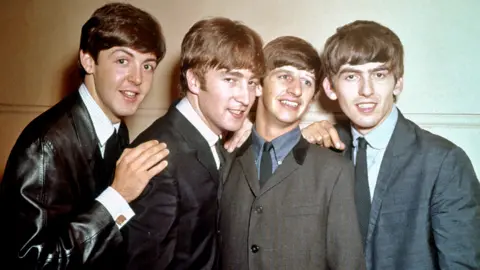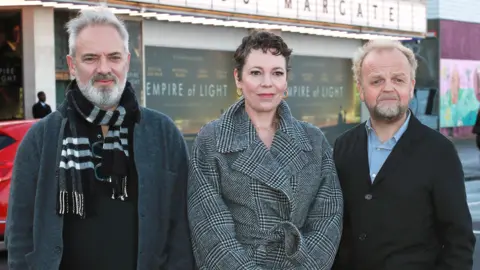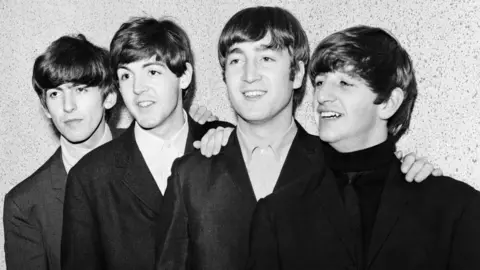The Beatles: Sir Sam Mendes to direct four films - one about each band member
 Getty Images
Getty ImagesDirector Sir Sam Mendes is to make four separate films about The Beatles - one from each band member's perspective.
Sir Paul McCartney, Sir Ringo Starr and the families of John Lennon and George Harrison have all granted permission and music rights for the four films.
The Oscar-winning director said he was "honoured to be telling the story of the greatest rock band of all time".
He added that he was "excited to challenge the notion of what constitutes a trip to the movies".
The films, made by Sony Pictures and Sir Sam's Neal Street Productions, will be released in cinemas in 2027.
It is not clear whether the four films will be released at once or have a staggered rollout, but Sony said they would have an "innovative release cadence" which would be announced at a later date.
The project marks the first time that The Beatles and their company Apple Corps have granted full life story and music rights for a scripted film, according to a statement.
Sir Sam has previously directed films such as 1917, American Beauty, Revolutionary Road, Empire of Light and two James Bond movies - Skyfall and Spectre.
The Beatles are widely considered the greatest British band of all time thanks to a string of classic albums such as Rubber Soul, Revolver, Sgt. Pepper's Lonely Hearts Club Band and Abbey Road.
 Getty Images
Getty ImagesTheir best known hits include Yesterday, Hey Jude, A Hard Day's Night, Eight Days A Week, Let It Be, Come Together, Here Comes The Sun, Twist and Shout, Love Me Do and Help!
The majority of their songs were written by Lennon and McCartney. Harrison was often said to have felt frustrated that his own compositions were not given equal weight by his bandmates.
Last year, the Beatles released what was described as their "final song". John Lennon started the song, titled Now and Then, in 1978, but it could not be completed until software advances allowed the remaining band-members to extract his vocals from a rough demo cassette.
The track topped the UK singles chart in November, making the Beatles the act with the longest gap between their first and last number ones.
Apple Corps said the four new films would "explore each Beatle's unique story and to bring them together in a suitably captivating and innovative way".
Producer Dame Pippa Harris said: "We intend this to be a uniquely thrilling, and epic cinematic experience.... To have The Beatles' and Apple Corps' blessing to do this is an immense privilege."
The Fab Four on film
The Beatles are no strangers to the silver screen, starring in several of their own films back in the 1960s - from the madcap comedy of A Hard Day's Night to the surreal psychedelia of Yellow Submarine.
Post break-up, they inspired dozens of feature-length tributes, from Sgt Pepper's Lonely Hearts Club Band (a disastrously garish musical starring the Bee Gees) to the touching coming-of-age tale I Wanna Hold Your Hand.
The latter, which followed a group of teens trying to gain entry to the Beatles' seminal performance on Ed Sullivan's TV show, marked the directorial debut of Back To The Future's Robert Zemeckis. And he's not the only big-name director to be seduced by the Fab Four's allure.
 Getty Images
Getty ImagesPeter Jackson's epic, four-part documentary Get Back repurposed footage shot during the recording of the band's final album; Martin Scorcese put together a revelatory documentary about "quiet Beatle" George Harrison in 2011; while Sam Taylor-Johnson dramatised John Lennon's early life in the stark-but-compelling Nowhere Boy.
Danny Boyle's Yesterday imagined a world where everyone forgets The Beatles, except for one struggling musician who takes credit for all their songs (hilarity ensues).
And Julie Taymor's Across The Universe used the band's music as the backdrop for a 1960s romcom that featured Bono in a very peculiar moustache singing I Am The Walrus. It was very, very not good.
Perhaps the best of the bunch is 1994's Backbeat - an independent film, directed by Iain Softley, that told the story of The Beatles' pre-fame days in Hamburg. By focusing largely on the story of the band's original bassist, Stuart Sutcliffe, it was unencumbered by the colossal cultural baggage of the band's subsequent output.
Coincidentally, Backbeat was turned into a novel by music journalist Alan Clayson - who later published a four-volume box set, telling the Beatles' story from the perspective of each individual band member. Sound familiar?
Still, Clayson's unauthorised biographies - with their tales of infidelity and drug use - are unlikely to be the starting point for Mendes' films, which have been rubber-stamped by the almighty Beatles Corporation.
But if there's any lesson from those books, it's that George Harrison and Sir Ringo Starr's volumes are much more compelling, simply because we're less familiar with the story beats.
Perhaps the biggest question is, can Mendes fix it so that each of his Beatles films will synch up when they're played simultaneously, like The Wizard Of Oz and Pink Floyd's Dark Side of the Moon?
Because that would really be worth a ticket to ride. Or four.
Correction: An earlier version of this story credited the story of Backbeat to Alan Clayson. The film was written by Iain Softley, Michael Thomas and Stephen Ward. Clayson's book was a novelisation of the screenplay.
